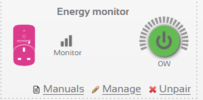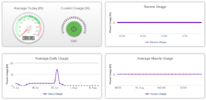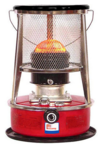Same here, but (I blame my other halfI boil my water with a stove kettle - gas is 1/4 of the price of electricity. Probably slightly less efficient, but not 75% less. And helps warm the room a little in winter.
Kind Regards, John
Same here, but (I blame my other halfI boil my water with a stove kettle - gas is 1/4 of the price of electricity. Probably slightly less efficient, but not 75% less. And helps warm the room a little in winter.
Around April 2017 (when there had been a significant {by those days standards!} hike in electricity prices), I very critically reviewed, and changed, my usage of electricity and, as a result, reduced my bills by 60%-70% - and that reduced usage has persisted every since (although prices have obviously gone up).Last April I started turning off everything not in use and noticed a drop in bills. Not sure how much.
Indeed, that was one of the most decisive changes I effected back in 2017. I had several ancient fridges and freezers which, when I measured, were using obscene amounts of electricity. It did not take all that long for the savings in running costs to repay the cost of replacing most of them (generally with 'the cheapest I could find'!).Big savings to be had by replacing ancient fridges and freezers, the modern ones may be very flimsy but they consume a lot less current than older ones.
Sure, that too - but I would hope that most people are aware of that by now (and, to a large extent, are being 'forced' to move to LEDs). It wasn't only the running costs, either. In the days of incandescents, with my very large house, I found myself having to buy large batches of bulbs every month or three - but now I buy small batches of LEDs every year or 3!Obvs ditch any tungsten lighting (especially if you have a zillion downlights at between 20 and 50w a go)
Probably true in that case but, as I've just written, the arithmetic is usually much more favourable in the case of ancient fridges/freezers (and obviously with incandescent lighting).I don't think it's that simple, just binning old electrical items... and replacing with new ones that are more efficient. If my plasma TV is £70 more per year to run, fair enough, but I will have to find £700+ to buy the replacement to get better efficiency.
Last April I started turning off everything not in use and noticed a drop in bills. Not sure how much.
Indeed. As I said, the most dramatic changes I achieved back in 2017 resulted from the replacement of a number of ancient fridges and freezers (most of which were approaching the ends of their lives, anyway), which had been consuming obscene amounts of electricity, 24/7The big overnight consumers are fridges and freezers, plus maybe any lights you leave on unnecessary over night.

I watched my daughter boil the electric kettle, and pour the water into the pan, and asked her why, she said it was faster, and I replied I don't think so that ring is rated 5.5 kW and the kettle is 2.8 kW.I boil my water with a stove kettle - gas is 1/4 of the price of electricity. Probably slightly less efficient, but not 75% less. And helps warm the room a little in winter.
Last April I started turning off everything not in use and noticed a drop in bills. Not sure how much.
 does work, both same make, one on left fixed size, so need cups to match, one on right you can set cup size, and stop it mid flow, so one on right seems better, but although same wattage, the one on left always faster, the cup size is a bleed back into main reservoir, so always boils a large cup of water, even if only set to deliver small cup.
does work, both same make, one on left fixed size, so need cups to match, one on right you can set cup size, and stop it mid flow, so one on right seems better, but although same wattage, the one on left always faster, the cup size is a bleed back into main reservoir, so always boils a large cup of water, even if only set to deliver small cup. or
or  I can monitor what I use with each plug in appliance, but soon lost interest, I will use it to see when battery charger has finished, or if beer brewing OK, but why bother? With a few exceptions like seeing if freezer is working OK, knowing what it used does not help, we buy a washing machine which weighs the cloths, and auto adjusts the cycle time, and water used, so it never uses the same amount of power even with same program, so what is the point in measuring?
I can monitor what I use with each plug in appliance, but soon lost interest, I will use it to see when battery charger has finished, or if beer brewing OK, but why bother? With a few exceptions like seeing if freezer is working OK, knowing what it used does not help, we buy a washing machine which weighs the cloths, and auto adjusts the cycle time, and water used, so it never uses the same amount of power even with same program, so what is the point in measuring? placed in the fire place would heat the room I am sure, but unless I do some thing silly like have a heat pump fitted, I should never need to do that, back in the late 50's early 60's these were common, I hope we have moved on since then?
placed in the fire place would heat the room I am sure, but unless I do some thing silly like have a heat pump fitted, I should never need to do that, back in the late 50's early 60's these were common, I hope we have moved on since then?Was in John Lewis's today casually looking at modern flat screen TV sets.
There were only 2 energy efficiency ratings quoted on all sets; F and G
(Their letters, not my swearing)

So you think we should switch them off at night?The big overnight consumers are fridges and freezers, plus maybe any lights you leave on unnecessary over night.
I did the same, however for a frost free freezer with a indicator to tell you during a power failure what was the max temperature reached is around the £750 upwards mark, if it lasts 10 years, then you have to consider swapping needs to save £75 per year to change it before it fails, typical power usage is around £250 per year, so in the main not worth renewing until it fails.As I said, the most dramatic changes I achieved back in 2017 resulted from the replacement of a number of ancient fridges and freezers (most of which were approaching the ends of their lives, anyway)

Does that include the power used to run the LNB? I looked at power used for Sky box, only a few watts, but to be able to monitor program changes, it needs to receive the satellite signal, which means LNB is powered up, which takes more power than the sky box.Was in John Lewis's today casually looking at modern flat screen TV sets.
There were only 2 energy efficiency ratings quoted on all sets; F and G
(Their letters, not my swearing)
I've never paid anything remotely like that much for any refrigeration appliance. I have my own power-failure and over-temp alarms, which cost almost nothing in components, and took only a small amount of time to construct.I did the same, however for a frost free freezer with a indicator to tell you during a power failure what was the max temperature reached is around the £750 upwards mark ...
You seem to be overlooking the fact that, as I said, the fridges and freezers I replaced were all probably close to the end of their lives already, so your arithmetic was not appropriate to my situation., if it lasts 10 years, then you have to consider swapping needs to save £75 per year to change it before it fails, typical power usage is around £250 per year, so in the main not worth renewing until it fails.
What does that refer to? You're surely not suggesting that it costs that much to run a modern fridge/freezer, are you?typical power usage is around £250 per year,
If you need to find a tradesperson to get your job done, please try our local search below, or if you are doing it yourself you can find suppliers local to you.
Select the supplier or trade you require, enter your location to begin your search.
Are you a trade or supplier? You can create your listing free at DIYnot Local
